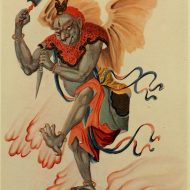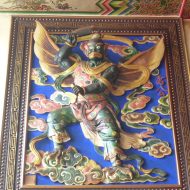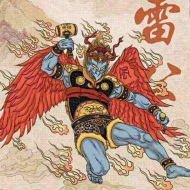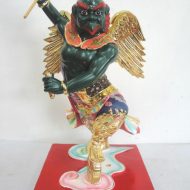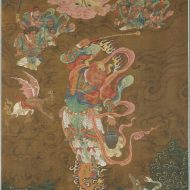Lei Gong : God of Thunder
Listen
At a glance
| Description | |
|---|---|
| Origin | Chinese Mythology |
| Classification | Hybrids |
| Family Members | Dian Mu (Wife) |
| Region | China |
| Associated With | Thunder. Lightning, Warfare |
Lei Gong
Introduction
Lei Gong, commonly known as the “Duke of Thunder” or the “God of Thunder,” holds a prominent position in Chinese Daoist mythology. Charged by the celestial realm with the responsibility of meting out justice, Lei Gong’s domain spans from earthly mortals guilty of hidden transgressions to malevolent spirits who exploit their knowledge of Daoism to inflict harm upon humanity. Within the intricate tapestry of Chinese mythology, Lei Gong emerges as a formidable and captivating figure, embodying the awesome power and profound mysteries associated with the forces of thunder and lightning.
Physical Traits
Lei Gong’s portrayal evokes a formidable and distinctive amalgamation of human and animal traits. Possessing claws, bat-like wings, and an azure hue, he symbolizes his divine lineage and mastery over thunder and lightning. Often depicted with a bird-like visage, characterized by a pointed beak, Lei Gong’s appearance exudes an aura of intimidation. His iconic implements include a drum and mallet, employed to generate thunder, alongside a chisel utilized for the chastisement of wrongdoers.
Across various interpretations, Lei Gong consistently maintains a fearsome demeanor. Imagined as a muscular, blue-skinned humanoid adorned with imposing claws and powerful wings reminiscent of a monstrous bird, he strikes an imposing figure. Certain renditions replace his human mouth with a long, pointed beak, accentuating his primal connection to the animal kingdom. Typically depicted in minimal attire, often limited to a simple loincloth, Lei Gong’s unadorned appearance underscores his raw strength and elemental affinity.
Family
Lei Gong is wedded to Dian Mu, revered as the goddess of lightning. As a formidable pair, they wield authority over the realms of thunder and lightning, commanding the elemental forces with unwavering power. Notably, Lei Gong finds his lineage intertwined with the esteemed King Wen of Zhou, an influential figure in ancient Chinese annals. Within his familial sphere, Lei Gong counts Fengbo, the god of wind, as his uncle, further enriching his divine lineage.
In their celestial endeavors, Lei Gong and Dian Mu are aided by a cadre of allies. Among them, Yunzhongzi, the youthful cloud generator, and Yushi, a lesser deity responsible for rain creation, stand as stalwart supporters. Dian Mu, renowned as the “Mother of Lightning,” harnesses her mastery over the dazzling flashes that accompany thunderous storms. Meanwhile, Yun Tong, known as the “Cloud Youth,” conjures tempestuous clouds, and Yuzi, the “Rain Master,” regulates the subsequent downpour. The winds, subject to the authority of Feng Bo or Feng Popo, depending on the rendition of the myth, complete the ensemble of elemental guardians.
Other names
Lei Gong is hailed by a multitude of titles, each illuminating a distinct facet of his divine essence. While “Lei Gong” remains his most recognized epithet, he is also revered under alternative monikers such as “Lei Shen,” signifying his role as the “God of Thunder,” and “Lei Kung” in alternative systems of transliteration. Across different regions and traditions, Lei Gong assumes various titles that mirror his diverse associations. Among these, he is sometimes honored as Leishen, a straightforward designation translating to “God of Thunder.” In specific locales, he earns recognition as Dianjun, the “Lightning Lord,” or Dianwang, the “Lightning King.”
Powers and Abilities
Lei Gong’s dominion transcends mere command over thunder and lightning. Renowned for his prowess in both punishing errant mortals and combating malevolent entities, Lei Gong wields a multifaceted arsenal of divine abilities. Employing his iconic drum and mallet, he orchestrates the resounding thunderclaps that reverberate through the heavens, while his chisel serves as an instrument of divine justice, striking down wrongdoers with righteous fervor. Moreover, Lei Gong commands a cadre of celestial assistants capable of manifesting a diverse array of heavenly phenomena.
As the god of thunder, Lei Gong harnesses boundless might. Armed with his imposing drum and mallet, he summons forth the booming tumult of thunder, a testament to his unrivaled authority. Yet, his prowess extends beyond auditory spectacles; with but a gesture, he conjures lightning bolts, unleashing their devastating force upon those deemed deserving of retribution. Furthermore, Lei Gong assumes the mantle of celestial arbiter, endowed with the discernment to unearth hidden transgressions and administer swift justice through the thunderous might at his disposal.
Modern Day Influence
Lei Gong’s enduring influence resonates strongly in contemporary times, captivating the imaginations of those delving into the depths of ancient Chinese culture and mythology. Across generations, his legends and tales have permeated Chinese literature, religious scriptures, and cultural customs, anchoring his significance firmly within the tapestry of Chinese folklore. Notably, his portrayal in the classic Chinese novel ‘La Investidura de los Dioses’ solidifies his pivotal role in shaping Chinese narrative traditions.
Even in the modern era, Lei Gong maintains a prominent presence in Chinese culture. His visage adorns temples and religious artworks, serving as a poignant reminder of the omnipotent force and intrinsic value of natural phenomena. Stories and proverbs featuring Lei Gong continue to be shared, preserving his mythological legacy for successive generations. Moreover, his influence transcends national boundaries, manifesting in various forms of popular culture such as video games, films, and other media, attesting to the enduring allure of his character.
While Lei Gong’s formidable countenance may evoke awe and reverence tinged with apprehension, at its core, he embodies a principle of cosmic equilibrium and order. His enduring presence serves as a poignant reminder of the majestic power inherent in the natural world, urging humanity to acknowledge and respect its inherent boundaries. As humanity embarks on its perpetual quest for understanding and enlightenment, figures like Lei Gong stand as timeless guardians, embodying the profound mysteries and wonders of the universe.
Related Images
Frequently Asked Questions
What is lorem Ipsum?
I am text block. Click edit button to change this text. Lorem ipsum dolor sit amet, consectetur adipiscing elit. Ut elit tellus, luctus nec ullamcorper mattis, pulvinar dapibus leo.
What is lorem Ipsum?
I am text block. Click edit button to change this text. Lorem ipsum dolor sit amet, consectetur adipiscing elit. Ut elit tellus, luctus nec ullamcorper mattis, pulvinar dapibus leo.
What is lorem Ipsum?
I am text block. Click edit button to change this text. Lorem ipsum dolor sit amet, consectetur adipiscing elit. Ut elit tellus, luctus nec ullamcorper mattis, pulvinar dapibus leo.
What is lorem Ipsum?
I am text block. Click edit button to change this text. Lorem ipsum dolor sit amet, consectetur adipiscing elit. Ut elit tellus, luctus nec ullamcorper mattis, pulvinar dapibus leo.
What is lorem Ipsum?
I am text block. Click edit button to change this text. Lorem ipsum dolor sit amet, consectetur adipiscing elit. Ut elit tellus, luctus nec ullamcorper mattis, pulvinar dapibus leo.

